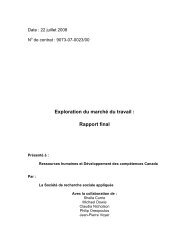Full report. - Social Research and Demonstration Corp
Full report. - Social Research and Demonstration Corp
Full report. - Social Research and Demonstration Corp
Create successful ePaper yourself
Turn your PDF publications into a flip-book with our unique Google optimized e-Paper software.
learn$ave Project: Final Reportmore expensive forms of education, generating largeramounts to claim as tuition credits, <strong>and</strong> second, will havelarger tax liabilities against which to claim a reduction.For low- <strong>and</strong> modest-income households with little or nonet tax liability, the tax credits are unlikely to offer anymeaningful incentive to invest in higher education.At the provincial level, Saskatchewan, Manitoba, NovaScotia <strong>and</strong> New Brunswick have introduced tax credits forrecent PSE graduates (regardless of age) who live in ormove to the province. In Nova Scotia, Manitoba <strong>and</strong> NewBrunswick, the credit is a non-refundable amount thatcan reduce income taxes payable but can’t lead to a refundof the difference. Furthermore, in Nova Scotia, the valueof the non-refundable credit is very low at just $2,000compared to the credit in Manitoba where it is worth upto $25,000 against taxes owed (spread over several yearsfollowing graduation). Only in Saskatchewan does themeasure operate as a refundable credit, making it worthup to $20,000 (paid out over several years) to eligiblePSE graduates living in the province. However, as Berger,Motte <strong>and</strong> Parkin (2007) note, these measures are largelyaimed at attracting or retaining young graduates inprovinces with rapidly aging workforces that are in highneed of young, skilled workers. Their effects in promotingparticipation in higher education among traditionalstudents, let alone working-age adults, are unclear at best.Direct cash transfers to individuals <strong>and</strong> families (non-repayable)These include grants, scholarships <strong>and</strong> bursaries tostudents distributed by federal, provincial <strong>and</strong> territorialgovernments on the basis of merit or need.In 2000, the federal government spent a total of about$500 million through research council scholarships,Canada Study Grants (Treasury Board Secretariat,2001 <strong>and</strong> 2008), <strong>and</strong> the Millennium scholarships <strong>and</strong>bursaries (Canada Millennium Scholarship Foundation,2000 <strong>and</strong> 2008). By 2008, that figure had grown to over$750 million through expansion of the Canada StudyGrants, larger annual expenditures from the MillenniumScholarship Foundation, <strong>and</strong> the introduction in 2004 ofthe Canada Access Grants for first-time PSE students fromlow-income families. The grants offer non-repayable assistanceto certain students with particularly high needson top of repayable student loans <strong>and</strong> students mustfirst apply <strong>and</strong> be eligible for a Canada Student Loan. Thescholarships through research councils are generallymerit-based <strong>and</strong> awarded based on performance <strong>and</strong>/orcontributions to graduate level research.In partnership with the Canada Millennium ScholarshipFoundation, provinces <strong>and</strong> territories also offer needsbasedgrants to students but almost exclusively restrictthese to full-time students <strong>and</strong>, in many cases, limiteligibility to single students who are still dependent onparental support, thereby excluding working-age adultseven if they meet the income test. Only Nunavut <strong>and</strong>Manitoba have joint access grants with the Foundationthat are more geared to adult learners. In Nunavut thegrants are available to Nunavut residents <strong>and</strong> l<strong>and</strong> claimsagreement beneficiaries for part-time or full-time studies.In Manitoba, adults who have recently obtained an adultsecondary diploma <strong>and</strong> are continuing in PSE studies (onfull- or part-time basis) may be eligible for the MillenniumAdult Learner Bursary worth up to $5,000 for studentsin their first year of a program. In 2009, the federalgovernment introduced a new suite of grants under theCanada Student Grants Program, to replace the programsoffered by the Foundation which closed in 2010. The newprogram includes specific grants for each of low- <strong>and</strong>middle-income families, low-income part-time students,low-income students with dependents <strong>and</strong> students withdisabilities. According to the Minister’s announcement,the policy intent is to offer assistance to larger numbersof students (Human Resources <strong>and</strong> Skills DevelopmentCanada, 2009), even if this meant reducing the per capitaamount received by students. In the program’s Grantfor Part-time Students with Dependents, perhaps thegrant most likely to reach working-age adults, the grantis capped at just $1,920 per year. It will not be clear forsome time whether or not the new grants will be animprovement over the Millennium grants.Outside partnerships with the federal government,provinces <strong>and</strong> territories offer assistance through scholarships,training grants <strong>and</strong> allowances, income support,<strong>and</strong> transfers for new apprentices. Ontario, for example,offers several needs- <strong>and</strong> merit-based bursaries to undergraduate<strong>and</strong> graduate students but generally only if theyare pursuing full-time studies (limited special bursariesare available or part-time students with high needs).Alberta’s Heritage Scholarship Fund offers scholarshipsfor First Nations students <strong>and</strong> cost-shared (with industry)scholarships for apprentices. The province also offers 200scholarships worth $500 each to recent adult graduatesof secondary upgrading or equivalency programs throughthe Adult High School Equivalency Scholarship availablewhen they enrol in full-time PSE studies. In 2005, Albertalaunched the Alberta Centennial Premier’s Scholarshipsas a national initiative to make 25 scholarships of $2,005each available to all other provinces <strong>and</strong> territories forlocal delivery to students. In nearly all cases, the scholarshipsare available only to full-time students <strong>and</strong> inseveral cases (e.g., New Brunswick, PEI, <strong>and</strong> Yukon) theyare available only to young students leaving secondaryschool. Newfoundl<strong>and</strong> <strong>and</strong> Labrador offer a merit-basedscholarship (the Successful PSE Transitions Scholarship)110 | Appendix A <strong>Social</strong> <strong>Research</strong> <strong>and</strong> <strong>Demonstration</strong> <strong>Corp</strong>oration




